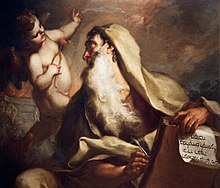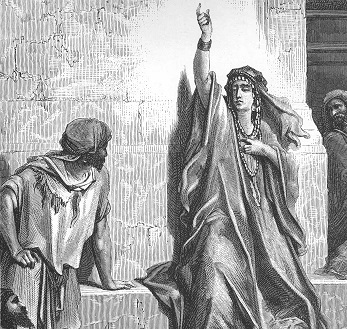Isaiah: The Prophet of Failure
“You whom I took from the ends of the earth, and called from its farthest corners, saying to you, ‘You are my servant, I have chosen you and shall not cast you off'” Isaiah 41:9
 The eighth century BC prophet Isaiah generally receives bad press for his portrayal of a wrathful God punishing the failures of his people. The idea of any kind of recompense for eschewing moral authority does not sit well with many nowadays.
The eighth century BC prophet Isaiah generally receives bad press for his portrayal of a wrathful God punishing the failures of his people. The idea of any kind of recompense for eschewing moral authority does not sit well with many nowadays.
Yet the meaning of Isaiah's name translates as “the Lord is Salvation” and the prophet served God for over sixty years. Indeed, by tradition Isaiah was cut in half on the orders of an offended king Manasseh - hardly an act of obedience to temporal authority from an adherent of a capricious, wrathful god. Was Isaiah's cruel death at the hands of Manesseh a sign of his failure? In worldly terms yes, but in truth Isaiah's martyrdom was a final act of loyalty to his God of wisdom and truth, and the culminating act in a long career delivering unwanted messages to the political elite.
The passage in Isaiah 41:9 is often quoted to comfort those suffering distress over rejection or failure. The emotional response to failure can be very destructive and life-changing, but it is important to recognise that from lack of success come valuable lessons. Chief amongst these is the attribute of humility and, to a lesser degree, that of resignation. The latter need not be a negative outcome, since it infers conformity to the will of a higher power outside of one's control. We cannot control everything, and the sooner we recognise that truth the better. So, if we look carefully at the text of this passage in Isaiah, we see that the “servant” he is talking about is not only the prophet himself, the individual man, but the entire people of Israel. This is because the name “Israel” translates as the “the servants (or slaves) of God.” It is a collective servant or slave. There is therefore a double meaning, since to be a slave is to be without any choice, whereas a servant is employed and serves his master willingly. If we accept that there is always an allegorical interpretation of scripture, we can begin to see that the “servant” chosen by God is not just an individual, but also the entire community. On another level it also refers to our conscious and unconscious selves.
that the “servant” he is talking about is not only the prophet himself, the individual man, but the entire people of Israel. This is because the name “Israel” translates as the “the servants (or slaves) of God.” It is a collective servant or slave. There is therefore a double meaning, since to be a slave is to be without any choice, whereas a servant is employed and serves his master willingly. If we accept that there is always an allegorical interpretation of scripture, we can begin to see that the “servant” chosen by God is not just an individual, but also the entire community. On another level it also refers to our conscious and unconscious selves.
How so? It has been argued that the subconscious is part of a collective (or "group soul" for want of a better description). It is that from which our shared spiritual memory and sense of spirituality derives. Our consciousness is the ego, the I AM. Our consciousness is only active in the waking state and can also be conditioned by environmental factors (such as our culture, life events, parenting, education etc). The subconscious is not restricted in this way, but neither is it capable of conscious direction either. In some ways these two principles equate to Adam as the Animus and Eve as the Anima - the archetypes of the soul.

Let us take for example the role of Isaiah's wife, Aya. She was known as "the Prophetess." No doubt this was because Aya enjoyed the same prophetic gift as her husband, as did Eve. Allegorically, however, because we know very little about her - and nothing at all about her prophetic gifts - Aya can be said to represent her husband's subconscious, or anima. The feminine counterpart to his conscious ministry, and that which we find so many times throughout the Secret Tradition. Indeed, the couple had two sons, Shear-jashub (meaning "a remnant shall return" and Maher-Shalal-Hash-Baz (meaning "quickly to spoils, plunder speedily."). These boys are clearly allegories for the spiritual and material aspects of man, of the Servant and Slave, order and chaos, Abel and his brother Cain, etc. So Isaiah and Aya are types, as are their two sons. It follows that the God of Wrath finds complementarity in being the God of compassion,. The Passage in Isaiah 41:9 fits in with this theology, since the suffering servant will not be cast aside by his god, notwithstanding he has been thrown about by the vicissitudes and stresses of life (“you whom I took from the ends of the earth and called from its farthest corners”).
 Yet we need to be careful when allegorising the Bible because of the danger of idolatry. A better way of describing this is to refer to the anthropomorphization of God. Israel was chosen not because of the people's will or their descent from Abraham, but because it was the will of God. They were chosen before time and, in this context, God allegorises the subconscious forces stirring within the conscious express will of Israel. Isaiah and Aya's task was to restore balance to that relationship, and to remind Israel that monotheism is by definition a practice of virtue as a discipline, since it encapsulates loyalty and exclusivity (to the detriment of selfish shortcuts by picking an choosing a deity for a given need or desire). That is the beauty of monotheism, which unifies the different aspects of the Divine Will (be it wrath or forgiveness) within the same Deity to whom and from whom loyalty is given, as well as unconditional love and security. In short, you have to learn to take the rough with the smooth. If you do not, and somehow manage to evade the rough, it is going to catch you up sooner or later and in grand style. This is why it is best to embrace suffering, disappointment and set-backs now, and with an attitude of acceptance.
Yet we need to be careful when allegorising the Bible because of the danger of idolatry. A better way of describing this is to refer to the anthropomorphization of God. Israel was chosen not because of the people's will or their descent from Abraham, but because it was the will of God. They were chosen before time and, in this context, God allegorises the subconscious forces stirring within the conscious express will of Israel. Isaiah and Aya's task was to restore balance to that relationship, and to remind Israel that monotheism is by definition a practice of virtue as a discipline, since it encapsulates loyalty and exclusivity (to the detriment of selfish shortcuts by picking an choosing a deity for a given need or desire). That is the beauty of monotheism, which unifies the different aspects of the Divine Will (be it wrath or forgiveness) within the same Deity to whom and from whom loyalty is given, as well as unconditional love and security. In short, you have to learn to take the rough with the smooth. If you do not, and somehow manage to evade the rough, it is going to catch you up sooner or later and in grand style. This is why it is best to embrace suffering, disappointment and set-backs now, and with an attitude of acceptance.
 Had the kingdom of Judah learned the true meaning of resignation to the will of God by listening to Isaiah earlier, then it would never have been attacked by the Assyrians. Yet at the hour of its greatest need, the prophet encouraged king Hezekiah to resist the invading Assyrians a second time, since he knew from experience of defeat and past suffering that this was now the time to act.
Had the kingdom of Judah learned the true meaning of resignation to the will of God by listening to Isaiah earlier, then it would never have been attacked by the Assyrians. Yet at the hour of its greatest need, the prophet encouraged king Hezekiah to resist the invading Assyrians a second time, since he knew from experience of defeat and past suffering that this was now the time to act.
“That night the angel of the Lord went out and put to death a hundred and eighty-five thousand in the Assyrian camp. When the people got up the next morning—there were all the dead bodies. So Sennacherib king of Assyria broke camp and withdrew. He returned to Nineveh and stayed there" (2 Kings 19:35-36).
This article is the copyright (c) of M.R. Osborne, 2022






